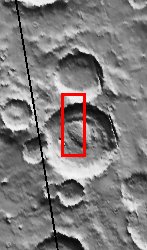Spallanzani Crater
Caption:

(Released 17 July 2002)
The craters on Mars display a variety of interior deposits one of which is shown here. Spallanzani Crater is located far enough south that it probably experiences the seasonal growth and retreat of the south polar cap. During the southern hemisphere winter, CO
2
frost condenses out of the atmosphere onto the surface and probably brings with it small amounts of dust and even water ice. It is this sort of depositional process that is thought to have produced the polar layered deposits. The layered deposit in Spallanzani Crater shares some similarities with the polar deposits. Whatever the origin of the layered materials, they likely filled the crater at one time. Note how the interior slope of the northern rim displays layered material of similar if less distinct morphology as the main deposit on the floor. The process that filled the crater with sediment has been replaced by the opposite process. Erosion has taken over, leaving behind spectacular stair-stepped mesas and bizarre, contorted landforms. Unlike the interior crater deposits in the equatorial latitudes, the erosional process has not produced the yardang features that indicate wind erosion. It may be that ice was one of the cementing agents of the sediment and perhaps the sublimation of that ice has left the sediment susceptible to erosion. The details of the deposition and erosion of this interesting deposit remain to be discovered.
Cataloging Keywords:
| Name |
Value |
Additional Values |
| Target |
Mars |
|
| System |
|
|
| Target Type |
Planet |
|
| Mission |
2001 Mars Odyssey |
|
| Instrument Host |
Mars Odyssey |
|
| Host Type |
Orbiter |
|
| Instrument |
Thermal Emission Imaging System (THEMIS) |
|
| Detector |
|
|
| Extra Keywords |
Atmosphere, Crater, Dust, Grayscale, Water |
| Acquisition Date |
|
| Release Date |
2002-07-17 |
| Date in Caption |
2002-07-17 |
|
| Image Credit |
NASA/JPL/Arizona State University |
| Source |
photojournal.jpl.nasa.gov/catalog/PIA03849 |
| Identifier |
PIA03849 |


